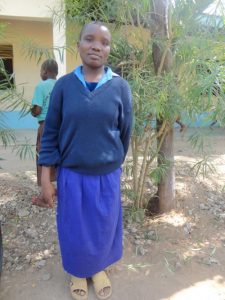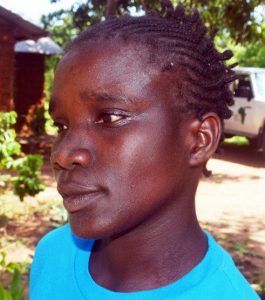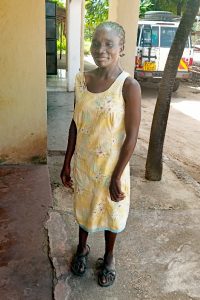Overcoming Transportation Barriers to Access Education: Margaret’s Story
by Sandra Bauer
Posted on August 5, 2022
Beliefs, Child, disability, education, Health, International, marginalized, stigma, vulnerable
In rural Kenya, most students must walk to school. Depending on how far away the school is, some students may walk up to eight miles each day. In many villages, none of the residents own cars, although a few own motorbikes. Some villages do not even have roads. This lack of transportation is especially problematic for children who can not walk or have difficulty walking. Many of these children do not attend school because of this problem. This was the case for Margaret.
Challenges in Childhood

Margaret at the Gede Special School
Margaret has mild cerebral palsy that limits the functioning of both her arms and legs. Her parents are peasant farmers who live in a mud hut with a thatched roof. East Africa’s severe drought conditions have made it difficult for the parents to provide food for their six children. Even though Margaret’s condition is mild, the closest school to her home is too far for her to walk. Therefore, when it was time for Margaret to begin attending school, she needed to live in a dormitory. Since only special schools have dormitories, Margaret wanted to attend the Gede Special School, where she could board alongside other children with disabilities but attend classes at the mainstream Gede Primary School. Unfortunately, her parents were unable to afford the school fees, so Margaret remained at home all through her childhood and teenage years.
Assistance From Abroad
When Margaret was 18-years-old, a woman from the United States learned of Margaret’s situation through Kupenda’s Child Sponsorship Program and decided to support her. The woman’s $30 monthly donations enabled Margaret to board at the Gede Special School and attend classes at the Gede Primary School.
Once she began school, Margaret received daily support from Kupenda’s occupational therapist and began making friends and playing sports. At times, Margaret struggled with her academics due to poor comprehension, limited eye-hand coordination, and tremors that make it difficult for her to write. However, Margaret’s time management skills, willingness to engage in group discussions, and focus on her education eventually enabled her to complete elementary school by the age of 25.

Margaret at the Sahajanand Secondary School
Progress Through Perseverance
Margaret then began attending the Sahajanand Secondary School. She was happy to be accepted and worked very hard. Her teachers developed an Individual Education Plan to help Margaret better cope and overcome some of her physical and learning challenges. Secondary schools in Kenya have a challenging curriculum. Each year, Margaret needed to complete several courses to graduate including, Swahili, English, Math, Biology, History, Agriculture, and Religion. Fortunately, at the age of 29, Margaret’s hard work paid off and she graduated from secondary school.
Next Up for Motivated Margaret
Margaret is now waiting to receive her secondary school final exam scores. She is hopeful they will be good enough for her to begin to attend a vocational school or a college later this year.
Even though Margaret started school much later than most students, her perseverance enabled her to accomplish her goal of completing her education.
Special thanks to Margaret’s sponsor for giving her the opportunity to learn, access therapy, make friends, play sports, and gain skills for a successful future!

Margaret After Graduating Secondary School
You can sponsor a child, like Margaret, for just $30 / month here!
And check out our Sponsorship Frequently Asked Questions here.
Want to keep updated on Kupenda’s work?
You can follow us on Facebook, Instagram, LinkedIn, and Twitter.
And please also sign up for our monthly newsletter and updates here.
If you’re interested in supporting one of the many children we serve, head over to our sponsorship page to learn about how you can make a difference for just $30 / month.



Leave a Reply